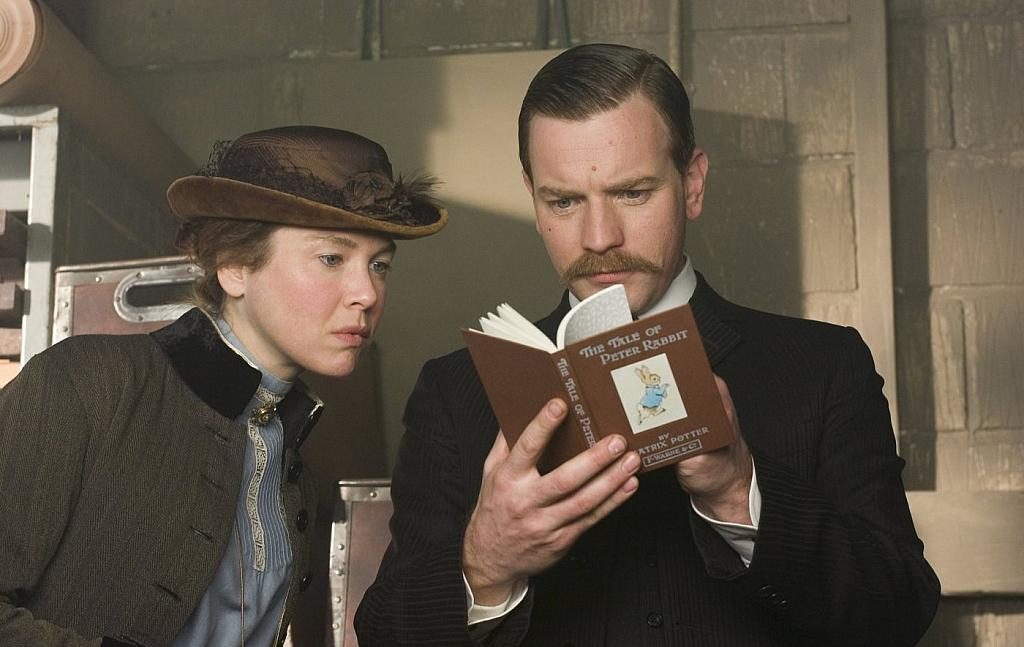
Peter Rabbit. Benjamin Bunny. Squirrel Nutkin. Miss Moppet. Johnny Town-Mouse. Any of them ring any bells? Born in 1866 in South Kensington, London, Beatrix Potter grows up loving to draw and weave imaginative tales about these friendly little animals. She regales her brother and nursemaid with stories of rabbits dressed up in natty jackets with brass buttons and ducks wearing shawls. As an adult, Beatrix becomes convinced that children would adore stories about those woodland friends, too. Unfortunately, she lives in an age when proper women are expected to dream of being obedient wives to someone of class, not published authors.
After experiencing a string of brush-offs, she brings her work to the Warne brothers and their modest publishing house. One brother rejects it outright, but another accepts the book as something of a throw-away project for younger brother Norman. Secretly, they fully expect it to be a disaster.
Norman, however, finds Beatrix’s work enchanting. He finds her enchanting as well and the two work hard to make the book successful. Along the way, they politely fall in love. Of course, Beatrix’s high-society mother is none-too-pleased with any of it. She’d rather that Beatrix throw aside this childhood nonsense and get serious about life. And she’d much rather her daughter stop “invit[ing] trades people into the house … they carry dust.” But none of the parade of “appropriate suitors” that Mother ushers in have any appeal for Beatrix. Being made of willful stuff, Beatrix determines to fight for the love, happiness and success the world tells her she shouldn’t desire.
The most compelling ingredient in this gentle little film is the unwavering hope and vibrant spirit of Beatrix herself (played to a glowing T by Renée Zellweger). For example, the publishing business was a closed door to women in Beatrix’s day, but she never gives up and never loses the joy of her work. And when the young authoress falls in love with Norman, she shuns the social code that says she must marry within her class. She also figures out ways to honor her parents’ wishes, even though it means keeping her love secret from family acquaintances and separating from Norman for several months.
Beatrix’s father always supports her in her “hobby,” but doesn’t expect it will amount to much. With time, though, he recognizes her smashing success and apologizes for not taking his daughter’s work seriously. He expresses pride in her achievements.
[Spoiler Warning] When Beatrix and Norman’s sister, Millie, first meet, they become fast friends. Neither has had any luck finding a suitable husband and they make a sort of pact to support each other in their singleness. After Norman’s proposal, Beatrix asks for her friend’s approval and Millie gives it with joy. Millie also embraces her beloved friend and pulls her out of depression when Norman dies.
Nothing that would even qualify as “sexual” in 2006. In 1906 maybe, but not now. Beatrix and Norman hold hands and share a chaste kiss. At one point, while Norman is looking at a framed picture of Jemima Puddle Duck, Beatrix (who has a habit of imagining her drawings into movement) sees the duck looking at Norman approvingly and wiggling her tail feathers in his direction. Beatrix tells her to be nice. Millie, frustrated with the lack of good men, says, “Men are bores, useful for only two things—financial security and procreation.”
A nursemaid tries to scare children into obedience by telling them, “They send the fairy beasts at night, with sharp teeth and an appetite for young flesh.”
One use of “b–tard.” During a noisy carriage ride a startled man in the park jumps out of the way and exclaims something (too indistinctly for me to catch).
During a Christmas party at the Potter house, guests drink wine and champagne. Norman also pours some brandy into after-dinner coffee cups. After he tells Beatrix’s maid/female escort that he did so, she drinks her fill and slumps over in a chair.
Beatrix’s mother is an insufferably class-conscious woman who constantly browbeats her daughter to drop all her peculiar pursuits and reclaim her proper social standing. Finally, Beatrix finds “peace” with her mother and tells her friend, “We’ve come to an understanding. We agreed to not understand each other.”
In today’s movie universe, the charming biopic Miss Potter is an anomaly, if not downright quaint. Foul language does not batter you, no one is shot or beaten, nothing explodes, implodes or regurgitates. And the screen is devoid of toilet-tinged cartoons, near-naked co-eds or insipidly mouthy fratboys. You’re left, then, with a sweet, simple story about a young woman’s creative imagination and determined spirit.
At first, it’s a bit of a shock to your system. But then you begin to relax and realize that something strange has happened. You actually care about the characters onscreen. Your senses focus and the scenes seem more intimate (to the point where a raised eyebrow can make you smile). The cast is perfectly balanced in a story that’s at times tragic but playfully hopeful. The director paints with a deft hand and gives the film a romantic blush, feeling for all the world like a watercolor painting that Miss Potter herself would appreciate.
Yes, the youngest viewers might find the pace unfamiliar and slow, and wish that the cute animated bits were more frequent. But moms and dads will be able to unwind and be entertained too. In fact, if Grampa happens to join the crew, you’re sure to hear him say, “Now that’s how they used to make movies.” If Squirrel Nutkin were around, well, he’d just tell another senseless riddle—but he lost his tail for that, now didn’t he?


After spending more than two decades touring, directing, writing and producing for Christian theater and radio (most recently for Adventures in Odyssey, which he still contributes to), Bob joined the Plugged In staff to help us focus more heavily on video games. He is also one of our primary movie reviewers.